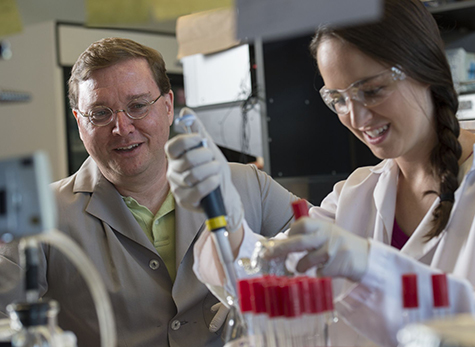
Joseph Jez, PhD, co-director of the plant and microbial biosciences graduate program in Arts & Sciences at Washington University in St. Louis, is one of 15 professors nationwide to receive $1 million over the next five years to bring the creativity he has shown in the lab to the undergraduate classroom.
The Howard Hughes Medical Institute (HHMI) created the HHMI Professors Program in 2002 to empower research scientists to apply to science education the same creativity and rigor that made them successful in scientific research.
In the past 12 years, 40 scientists have been appointed HHMI professors, receiving grants to support innovation in undergraduate science education.
In the current competition, which opened in April 2013, HHMI invited 106 research universities classified by the Carnegie Foundation for the Advancement of Teaching as having “very high research activity” to nominate faculty members.
A panel of scientists and educators reviewed 173 nominees’ proposals and eventually selected 15 HHMI Professors at 13 universities.
HHMI announced the selections in a June 30 news release.
Jez, associate professor of biology in Arts & Sciences, studies the molecular basis of biological processes in plants, microbes and nematodes.
He plans to use the HHMI grant to launch a two-year program in fall 2016. Called the Biotech Explorers Pathway, it will introduce entering students to both the science and business of biotechnology.
“Within my research group and in my courses,” Jez said, “I often draw on my experiences in biotech as an undergraduate in a professor’s start-up and later as a scientist at an established company to capture the imagination of students by helping them understand how discovery leads to application.”
In their first year of the Biotech Explorers Pathway, students will develop science-based case studies of St. Louis biotech companies and participate in seminars led by founders and directors of local companies.
They will have the opportunity to practice job interviews with scientists and managers from those companies.
“Lectures and textbooks fall short of providing insight into the challenges of converting ideas to real-world products,” Jez said. “But this class will bring in people from the St. Louis biotech community to share their experiences and perspectives with the students.”
In the second year of the Biotech Explorers Pathway, teams of four students led by a graduate student or postdoctoral associate will generate project ideas and write them up as proposals, ultimately preparing two-minute elevator pitches for their projects.
The class will identify the top five project pitches, which then will be polished in the second semester and ultimately presented to a review panel. Students completing the Pathway will be eligible for summer fellowships to smooth their transition to capstone experiences.
Remarkably, Jez hopes to pull in students interested not just in science and engineering but also in business. “The long-term goal of the Biotech Explorers Pathway,” he said, “is to train the next generation of science and business leaders and to provide a model for transmitting the excitement and value of scientific research to undergraduate students.”
In addition to establishing the Biotech Explorers Pathway, Jez will use the HMMI funds to support undergraduate research teams in his own lab and in an upper-level laboratory course he has developed where teams of students work on research questions that turn on protein structure and function.
Team-based approach
Jez has served as a mentor to more than 60 students either in his own lab or through the WUSTL International Genetically Engineered Machine (iGEM) team, which competes in an international competition in synthetic biology. Nearly all of these students have continued in science and technology after graduation.
Jez credits this success in part to a team-based approach to research. Typically in his lab two to four students work with an advanced student who serves as a peer-mentor. A graduate student or postdoctoral associate, and Jez himself, periodically review the team’s progress.
The team-based approach reduces the lack of continuity introduced by the academic calendar, gives advanced students practice with teaching and mentoring, and provides younger students with a role model for undergraduate research.
Finally, the HHMI grant will help support a lab course in protein chemistry Jez developed in 2010. Each year, the students in this extremely popular course frame a problem related to protein function that emerges from research in a WUSTL lab. They plan a series of experiments to solve the problem. The experiments are then divided up among work groups in the class.
As in Jez’s other initiatives, undergraduates are treated as full participants in the research endeavor. “Students overwhelmingly value projects that lead to the generation of scientific knowledge and allow them to develop their own ideas and become intellectual entrepreneurs,” Jez said.
Jez is the second WUSTL faculty member to be named an HHMI Professor. Sarah C. R. Elgin, PhD, the Viktor Hamburger Professor of Arts & Sciences, was in the inaugural group of professors chosen in 2002.
With HHMI funding, Elgin has established the Genomics Education Partnership that gives students an opportunity to do original research by participating in a large-scale genome sequencing and annotation research project. For more information about her educational initiatives and to read her HHMI biography, visit here.